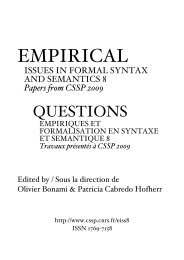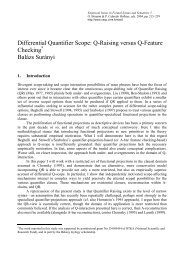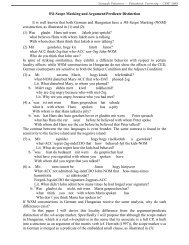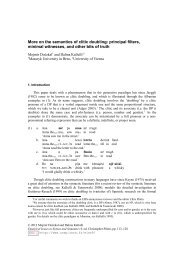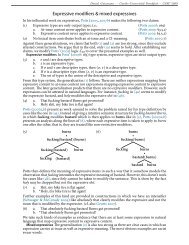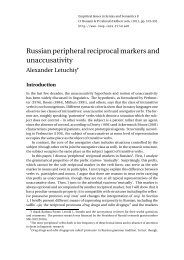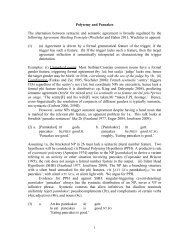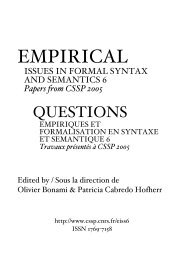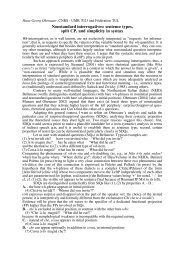Empirical Issues in Syntax and Semantics 9 (EISS 9 ... - CSSP - CNRS
Empirical Issues in Syntax and Semantics 9 (EISS 9 ... - CSSP - CNRS
Empirical Issues in Syntax and Semantics 9 (EISS 9 ... - CSSP - CNRS
You also want an ePaper? Increase the reach of your titles
YUMPU automatically turns print PDFs into web optimized ePapers that Google loves.
What this data shows us is that PPIs, similarly to NPIs, can be sensitive to non-truth conditional<br />
aspects of mean<strong>in</strong>g, offer<strong>in</strong>g further support for an <strong>in</strong>tegration of PPIs with<strong>in</strong> the larger<br />
doma<strong>in</strong> of polarity items. Before conclud<strong>in</strong>g, it is worth po<strong>in</strong>t<strong>in</strong>g out that presuppositional elements<br />
belong to the same class of licensers as few <strong>in</strong> that they too may or may not allow PPIs<br />
to survive <strong>in</strong> their scope depend<strong>in</strong>g on whether or not the PPI is sensitive to the non-truthconditional<br />
components. 10 One such example is provided by only, given <strong>in</strong> (41).<br />
(41) Only John ate someth<strong>in</strong>g. ̌only>PPI<br />
Note that only is similar to few <strong>in</strong> that it licenses weak NPIs (e.g. any/ever) but not strong NPIs<br />
(e.g. <strong>in</strong> weeks). What dist<strong>in</strong>guishes only from few, however, is that only carries a presupposition,<br />
its prejacent, rather than an implicature. In our discussion above we concluded that English PPIs<br />
like someth<strong>in</strong>g are sensitive to the non-truth-conditional aspects of mean<strong>in</strong>g, so an element like<br />
only is correctly expected to allow PPIs of this k<strong>in</strong>d to survive <strong>in</strong> its scope given that it generates<br />
a presupposition that disrupts the entailment relations. The current analysis predicts that<br />
the Dutch PPI allerm<strong>in</strong>st ‘not <strong>in</strong> the least’, which was shown to be <strong>in</strong>sensitive to implicatures<br />
based on the ungrammaticality of (39c), should also be <strong>in</strong>sensitive to presuppositions <strong>and</strong> thus<br />
disallowed from the scope of only. This prediction is <strong>in</strong>deed borne out as shown <strong>in</strong> the examples<br />
below where a clear contrast is observed between it <strong>and</strong> een beetje ‘a bit’, a PPI sensitive to the<br />
non-truth-conditional aspects of mean<strong>in</strong>g, be they implicatures, shown <strong>in</strong> (40c), or presuppositions,<br />
shown <strong>in</strong> (42).<br />
(42) a. *Alleen Jan is allerm<strong>in</strong>st gelukkig.<br />
Only John is <strong>in</strong> the least happy.<br />
b. Alleen Jan is een beetje gelukkig.<br />
Only John is a bit happy.<br />
(Mark de Vries p.c.)<br />
4.7. Rescu<strong>in</strong>g by negation<br />
In this section I discuss the rescu<strong>in</strong>g-by-negation facts. The observation is that if we further<br />
embed a sentence such as (43) <strong>in</strong> a DE context as <strong>in</strong> (44), the result becomes consistent. Specifically,<br />
we can conclude that be<strong>in</strong>g embedded under two DE operators is equivalent to be<strong>in</strong>g <strong>in</strong> a<br />
positive environment for the purposes of exhaustification. Given that the alternatives are superdoma<strong>in</strong>s,<br />
the requirements of E are satisfied as every alternative is weaker <strong>and</strong> thus more likely<br />
than the assertion. The derivation is provided below <strong>in</strong> (44).<br />
(43) *John didn’t see someone [+DE ]. *not>PPI<br />
(44) Few people thought that John didn’t see someone [+DE ]. ̌few>not>PPI<br />
a. Assertion: ¬(¬∃x∈D[saw(John,x)])<br />
b. Alternatives: {¬(¬∃x∈D ′ [saw(John,x)]): D⊂D ′ }<br />
c. E D [Few people thought that John didn’t see someone [+DE ]] =<br />
¬(¬∃x∈D[saw(John,x)]) ∧ ∀D ′ ⊃D [(¬(¬∃x∈D [saw(John,x)])) ⊳ c<br />
(¬(¬∃x∈D ′ [saw(John,x)]))] =<br />
∃x∈D[saw(John,x)] ∧ ∀D ′ ⊃D [(∃x∈D[saw(John,x)]) ⊳ c (∃x∈D ′ [saw(John,x)])]<br />
10 I would like to thank an anonymous reviewer for suggest<strong>in</strong>g I <strong>in</strong>clude presuppositional items <strong>in</strong> this discussion.<br />
239



